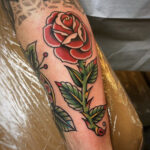Getting a tattoo is an exciting step, whether it’s your first piece of ink or adding to an already impressive collection. That anticipation the night before your appointment is a feeling many tattoo enthusiasts know well. To ensure a smooth and positive experience for both you and your tattoo artist, proper preparation is key. Knowing exactly What To Do Before Getting A Tattoo can significantly impact your comfort and the quality of the final artwork. This comprehensive guide will walk you through everything you need to do to prepare for your tattoo appointment, ensuring you’re ready for your session.
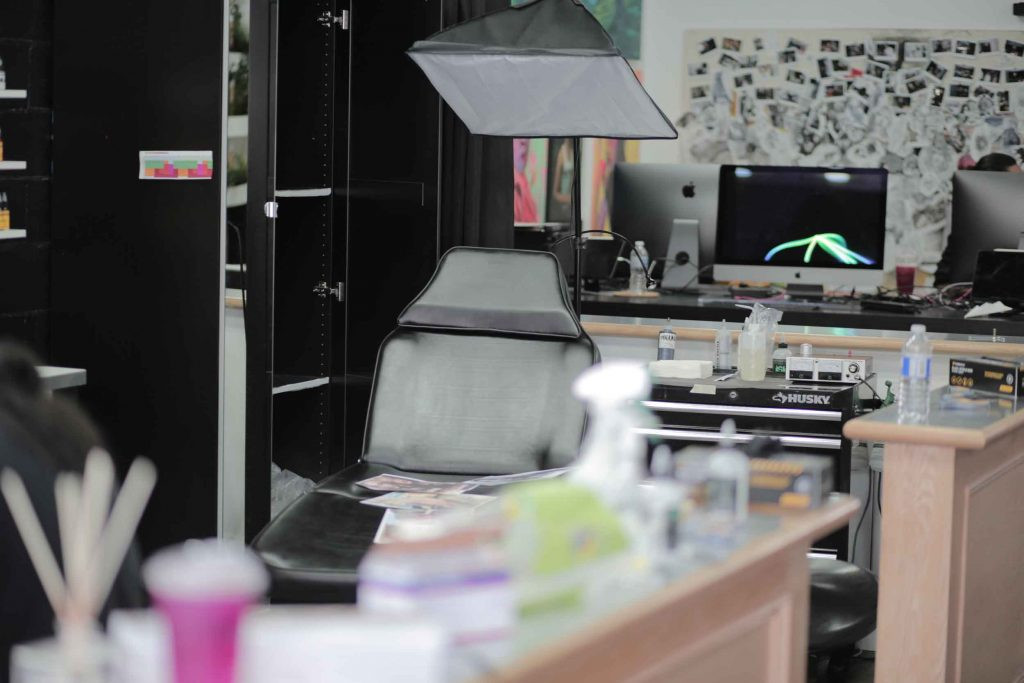 Tattoo artist preparing for a tattoo session
Tattoo artist preparing for a tattoo session
Essential Steps to Take Before Your Tattoo
Preparing for a tattoo isn’t just about showing up; it’s about ensuring your body and mind are in the best possible condition to receive and heal from the tattoo. By following these steps, you’ll not only make the process easier for your artist but also contribute to a better healing process and tattoo outcome. Let’s dive into the essential things to do before getting a tattoo.
1. Prioritize Sleep: Get a Good Night’s Rest
Adequate sleep is crucial in the days and especially the night before your tattoo appointment. Being well-rested allows you to be more alert, responsive to your body’s signals, and better equipped to manage any discomfort during the tattooing process. Imagine trying to sit still and focused for hours when you’re exhausted – it’s not ideal for you or your artist. Aim for at least 7-8 hours of quality sleep before your session.
If you arrive at your appointment feeling tired, it’s important to let your tattoo artist know. This helps them understand if you seem more sensitive to pain or need more breaks. Being upfront ensures they can adjust their approach to make the session as comfortable as possible for you. Prioritizing sleep is a simple yet highly effective step in preparing for your tattoo.
 Person sleeping soundly in bed
Person sleeping soundly in bed
2. Hydrate Properly: Drink Plenty of Water
Hydration is another fundamental aspect of tattoo preparation. Just as water is vital for overall health, it plays a significant role in skin health and elasticity, both of which are crucial for tattooing. Well-hydrated skin is easier for tattoo needles to penetrate, leading to a smoother tattooing process and potentially less discomfort.
Start increasing your water intake at least 24 hours before your tattoo appointment. A general guideline is to drink around eight 8-oz glasses of water daily, but you might need more depending on your activity level and climate. Hydrated skin not only accepts tattoo ink better but also tends to heal more effectively afterward. Even if you’re usually good about hydration, consciously increasing your water intake in the day leading up to your tattoo is a smart move. Consider bringing a water bottle with you to your appointment to stay hydrated throughout the session as well.
3. Shave the Area: Prepare Your Skin Surface
If the area you plan to tattoo has hair, it’s necessary to shave it beforehand. Tattooing over hair is not only unhygienic but also makes it impossible for the artist to apply stencils and work effectively. Shaving 2-3 days before your appointment is recommended. This timeframe allows any minor nicks or irritation from shaving to subside before your tattoo session, minimizing skin sensitivity.
If you’re uncomfortable shaving yourself or are concerned about skin irritation, ask a friend or family member for assistance. Alternatively, you can request your tattoo artist to shave the area for you right before the session. Just let them know in advance so they can allocate time for this. Avoid waxing or using hair removal creams close to your appointment, as these methods can sometimes irritate the skin and may not be suitable immediately before tattooing. Gentle shaving is typically the best approach.
4. Shower Before Your Appointment: Maintain Hygiene
Showering before your tattoo appointment is a basic but essential step in maintaining hygiene. Clean skin is crucial for preventing infections and ensuring a sanitary tattooing environment. Tattooing involves creating small punctures in the skin, making it vulnerable to bacteria. Arriving clean minimizes the risk of introducing any unwanted bacteria into the open skin.
Make sure to shower on the day of your appointment. Avoid using heavily scented soaps or lotions right before, as these could potentially irritate the skin or interfere with the tattoo process. Simply washing with a mild soap and water is sufficient. It’s also advisable to avoid showering immediately before if you tend to experience redness or sensitivity afterward; give your skin a little time to settle down before your session begins. Showing up clean is a sign of respect for your artist and a crucial step in ensuring a safe tattoo experience.
 Person showering before tattoo appointment
Person showering before tattoo appointment
5. Moisturize Your Skin: Keep It Supple
Moisturizing your skin in the days and weeks leading up to your tattoo appointment is highly beneficial. Well-moisturized skin is healthier, more elastic, and generally more receptive to tattoo ink. However, it’s important to note: do not moisturize on the day of your tattoo. Applying lotion right before your session can create a slippery surface, potentially interfering with stencil application and the tattooing process itself.
Start moisturizing the area you plan to tattoo a few days to a week beforehand, ideally 1-2 times a day. Choose a fragrance-free, hypoallergenic moisturizer to minimize any risk of skin irritation. Pay extra attention to moisturizing if you have naturally dry skin or if it’s during the colder months when skin tends to be drier. Hydrated skin will aid in a smoother tattoo application and can contribute to better ink saturation and healing.
6. Eat a Meal and Bring Snacks: Fuel Your Body
Having a good meal before your tattoo session is vital, especially for longer appointments. Your body needs energy to endure the tattooing process, and going in on an empty stomach can lead to lightheadedness, fatigue, or even fainting. Eat a balanced meal a couple of hours before your appointment. Choose foods that provide sustained energy, such as complex carbohydrates, protein, and healthy fats.
Additionally, bringing snacks and drinks to your tattoo appointment is highly recommended, especially for longer sessions. Pack items like granola bars, fruit, nuts, or juice. These can help maintain your blood sugar levels and keep you comfortable throughout the process. Many tattoo studios, like Playhouse, offer water, but having your own snacks ensures you have something you like and need, particularly if you have dietary restrictions or preferences. Keeping your body fueled will make the tattoo experience much more manageable.
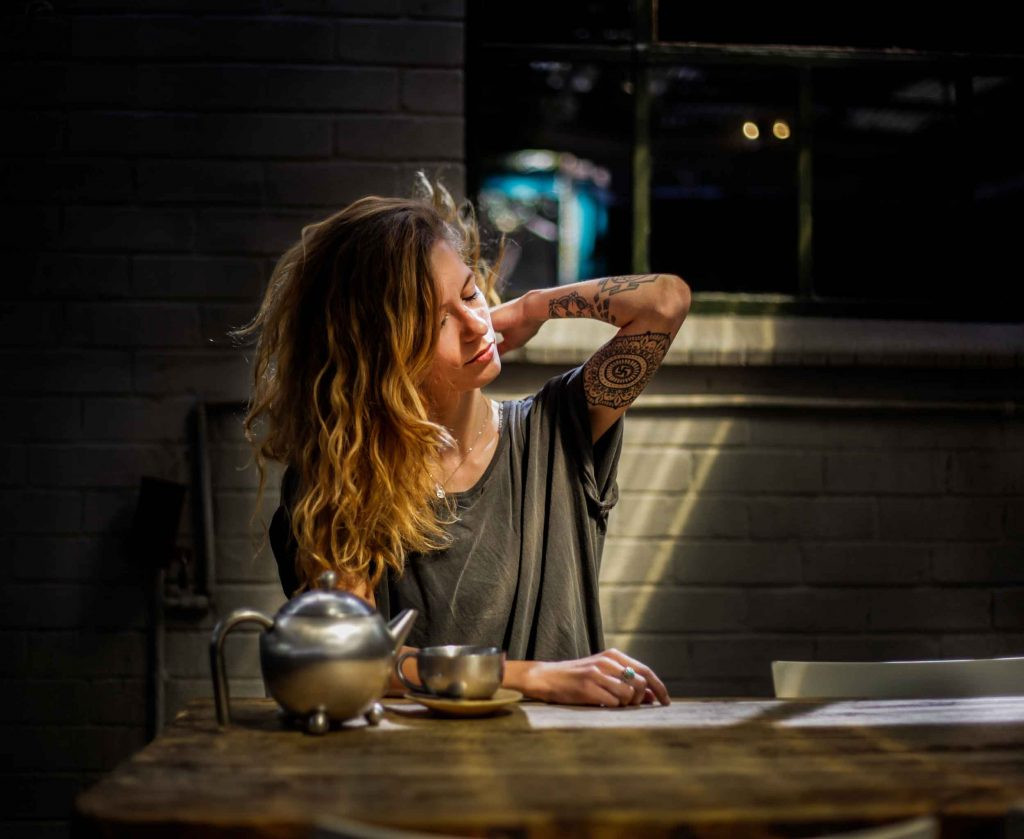 Healthy breakfast before a tattoo appointment
Healthy breakfast before a tattoo appointment
7. Dress Comfortably: Choose the Right Clothing
Comfort is key when it comes to what to wear to your tattoo appointment. You’ll likely be sitting or lying down for an extended period, so restrictive clothing can become very uncomfortable. Opt for loose, comfortable clothing that allows easy access to the area being tattooed. For example, if you’re getting a leg tattoo, wear shorts or loose pants. For an arm tattoo, a tank top or loose-sleeved shirt works well.
Wearing comfortable clothing helps you relax and allows your artist easy access to the tattoo area without unnecessary adjustments or discomfort. It also prevents clothing from rubbing against the fresh tattoo afterward. Consider the placement of your tattoo when choosing your outfit to ensure both comfort and accessibility during your session.
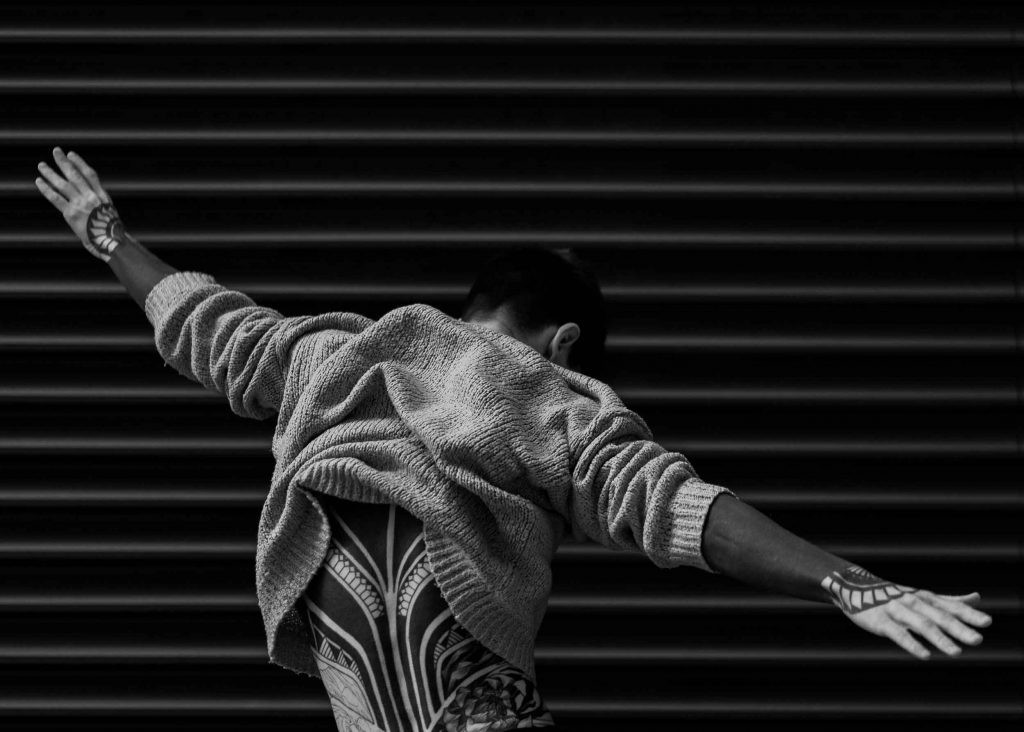 Person wearing comfortable clothes for a tattoo session
Person wearing comfortable clothes for a tattoo session
What Not To Do Before Getting A Tattoo
Just as important as knowing what to do before getting a tattoo is understanding what to avoid. Certain actions can negatively impact your tattoo experience, the quality of the tattoo, and your healing process. Here are key things to avoid before your tattoo appointment.
8. Avoid Alcohol and Blood Thinners: Stay Sober and Clear-Headed
Consuming alcohol or taking blood thinners before your tattoo appointment is strictly prohibited. Alcohol thins your blood, which can lead to excessive bleeding during the tattooing process. This not only makes it harder for the artist to work but can also affect ink saturation and the final appearance of your tattoo. Additionally, alcohol impairs your judgment, which is not ideal when making permanent body art decisions.
Similarly, avoid taking aspirin or other blood-thinning medications before your appointment. If you are on prescription blood thinners, consult your doctor and your tattoo artist beforehand to discuss any potential risks and necessary precautions. Showing up sober and avoiding blood thinners ensures a safer and more effective tattoo session.
9. Protect Your Skin: Avoid Sunburns and Damaged Skin
It’s crucial to protect your skin from sunburns and damage before your tattoo appointment. Tattooing sunburned or damaged skin is a no-go. Sunburned skin is already inflamed and damaged, making it unsuitable for tattooing. Tattooing on compromised skin can lead to complications, poor ink absorption, and a prolonged healing process.
If you have any cuts, bruises, fresh tans, or sunburns in the area you plan to tattoo, your appointment will likely need to be rescheduled. Ensure your skin is healthy and intact before your session. Avoid excessive sun exposure in the weeks leading up to your appointment and use sunscreen to protect your skin. Healthy, undamaged skin is essential for a successful tattoo.
10. Skip Intensive Exercise: Avoid Muscle Soreness
While regular exercise is healthy, avoid intense workouts right before your tattoo appointment, especially if you’re getting tattooed on a muscle group you’ve just worked out. Intensive exercise can make your muscles sore and sensitive, potentially increasing discomfort during the tattoo session. Sore muscles can also make it harder to sit still for extended periods.
Light exercise is generally fine, but avoid strenuous workouts on the day of your tattoo, particularly in the area to be tattooed. Being relaxed and physically comfortable will contribute to a more pleasant tattoo experience.
11. Respect the Studio: Don’t Touch Equipment or Disrupt the Space
When you arrive at the tattoo studio, it’s important to respect the artist’s workspace and equipment. Tattoo studios maintain strict hygiene standards, and artists meticulously set up their stations to ensure a sterile environment. Touching tattoo equipment, needles, or ink bottles can contaminate the area and increase the risk of infection.
Avoid touching anything in the artist’s workspace unless specifically invited to do so. If you need something or have a question, ask your artist. Respecting the studio’s hygiene protocols is crucial for your safety and the smooth operation of the tattoo process.
12. Communicate Changes: Avoid Last-Minute Cancellations
Life happens, and sometimes you need to reschedule appointments. However, last-minute cancellations can be very disruptive for tattoo artists. Artists often book appointments in advance and rely on their schedule. Canceling at the last minute means they lose that time slot, and it can be difficult to fill it on short notice.
If you need to reschedule your tattoo appointment, provide as much notice as possible. Ideally, give at least 48-72 hours’ notice. This allows your artist to adjust their schedule and potentially offer the slot to another client. While emergencies are understandable, timely communication is key to maintaining a good relationship with your tattoo artist and respecting their time.
 Friends enjoying entertainment during a long tattoo session
Friends enjoying entertainment during a long tattoo session
During Your Tattoo Session
Preparing for your tattoo also includes considering what to do during the session itself to make it as comfortable and efficient as possible.
13. Bring Entertainment: Distract Yourself
For longer tattoo sessions, bringing entertainment can be a great way to pass the time and distract yourself from any discomfort. Listening to music, podcasts, or watching movies can help make the time go by faster. Bring headphones so you can enjoy your entertainment without disturbing your artist or others in the studio.
Choose forms of entertainment that don’t require much movement or interaction, so you can remain still and allow your artist to focus. A phone, tablet, or e-reader are all good options. Having something to occupy your mind can make a significant difference in your overall tattoo experience, especially during longer sessions.
14. Consider Bringing a Friend: Moral Support
Bringing a friend to your tattoo appointment can provide moral support and make the experience more enjoyable, especially if it’s your first tattoo. Having a friend there can help you relax, offer encouragement, and simply provide company. However, be mindful of studio policies regarding guests, as some studios have limited space or prefer clients to come alone to minimize distractions.
If you plan to bring a friend, check with the studio beforehand to ensure it’s allowed. Avoid bringing large groups, as this can be disruptive. A supportive friend can be a great addition to your tattoo experience, but always prioritize the comfort and workflow of the tattoo artist and studio environment.
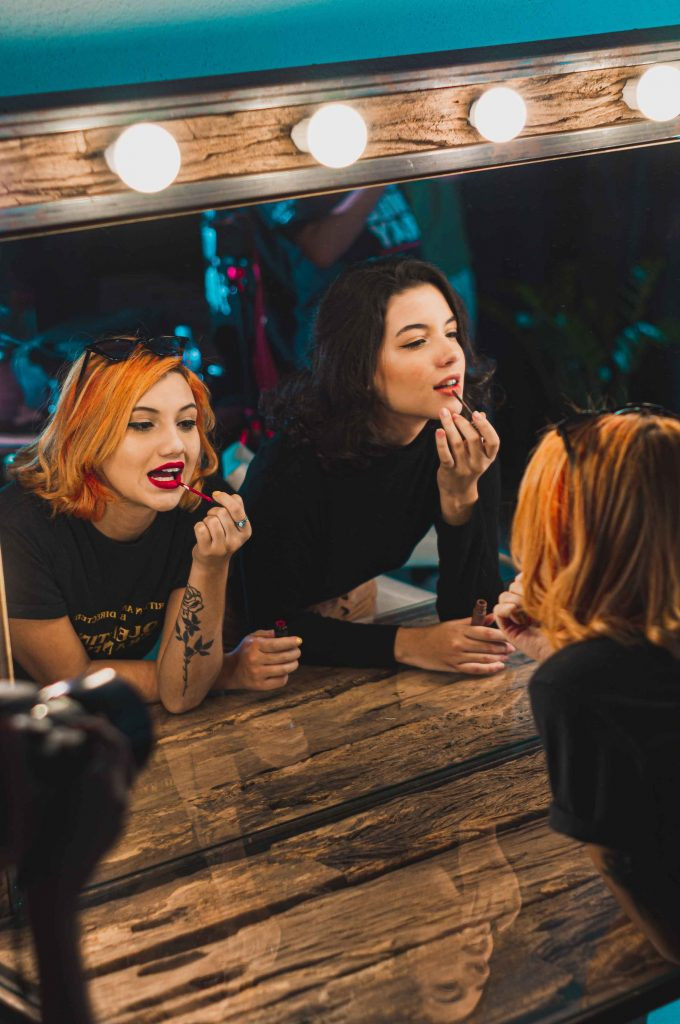 Friend supporting during a tattoo session
Friend supporting during a tattoo session
15. Ask Questions: Stay Informed and Comfortable
If you have any questions or concerns during your tattoo session, don’t hesitate to ask your artist. Whether it’s about the process, aftercare, or anything else that comes to mind, your artist should be happy to provide information and reassurance. Open communication ensures you feel comfortable and informed throughout the process.
Asking questions is a sign of engagement and helps you understand what’s happening. A good tattoo artist will be professional, knowledgeable, and willing to address any questions you may have. Don’t be shy – clear communication leads to a better experience for everyone.
Final Thoughts
Getting a tattoo is a memorable and personal experience. Being well-prepared by following these guidelines will not only make the process smoother and more comfortable for you but also demonstrate respect for your tattoo artist and contribute to the best possible outcome for your new ink. Remember, preparation extends beyond the tattoo session itself; aftercare is equally crucial for healing and maintaining the vibrancy of your tattoo. For detailed aftercare instructions, be sure to check out our comprehensive tattoo aftercare guide. By taking these steps, you’re setting yourself up for a positive and rewarding tattoo journey.

